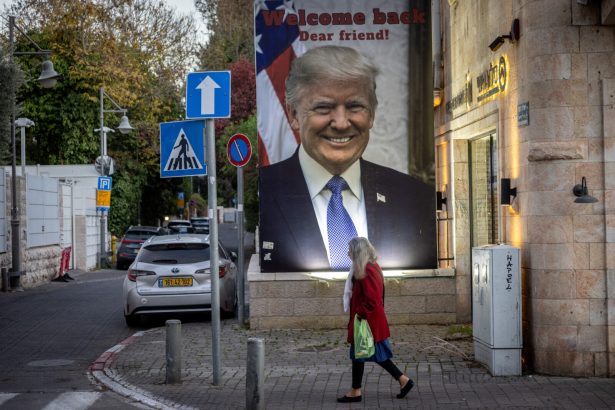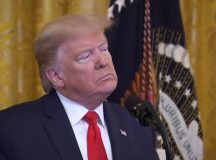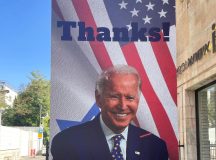Paul Gross considers an ostensibly implausible but tantalising possibility.
Hearing some of the wildly enthusiastic responses to Donald Trump’s election victory by the most messianic, annexationist members of the Israeli right, my first thought was that they need to read Barak Ravid’s Trump’s Peace for a reality check. First published in Hebrew less than a year after Trump’s departure from the White House in 2021, the English version came out last year. Ravid, an experienced Israeli journalist, had been granted extraordinary access to the key players behind the Abraham Accords, including Jared Kushner and Trump himself. The result is a doorstop of a book, exhaustively covering the entire period of Trump’s tenure as it relates to Israel and the Middle East. What emerges from this account is a far more nuanced picture than either Trump’s fans or critics would assume.
In his first term, Trump followed a pro-Israel policy due largely to his commitments to his devoutly pro-Israel Christian base – ‘That was for the Evangelicals’ he told Ravid in an interview, referring to the Embassy move to Jerusalem – but also because of the influence of advisors like his son-in-law Kushner, or his Ambassador to Israel David Friedman; two men with long-standing personal ties to Israel. There were other factors too, including Trump’s desire to upend ‘the system’; to do things that previous Presidents talked about but were restrained from doing for fear of upsetting the diplomatic apple cart. The Embassy relocation and recognition of Israeli sovereignty over the Golan Heights fall into this category, as do two moves against Iran – the withdrawal from the JCPOA nuclear deal, and the assassination of Qasem Soleimani – both popular in Israel (though the first was in fact not supported by many in Israel’s security establishment.)
There is every reason to believe Trump will continue to be broadly pro-Israel in his second term; certainly his three most important foreign policy appointments point in that direction: Marco Rubio as Secretary of State, Pete Hegseth as Secretary of Defense, and Mike Waltz as National Security Advisor. But as explained above, Trump’s pro-Israel inclinations do not stem from a deep, personal attachment to the Jewish state or the Zionist idea. In that he’s very different from, not only Joe Biden, but a succession of US Presidents from both parties, including Bill Clinton and George W. Bush. As I’ve argued elsewhere, there is certainly a case to be made that he will act transactionally in a way that is to Israel’s detriment.
But here I want to focus not on whether he will be supportive of Israel, but on what ‘support’ will mean. Because despite the orgy of excitement from the likes of Bezalel Smotrich, that Trump’s return to the White House is a green light for annexation of the West Bank, it is evident from Barak Ravid’s book that the re-elected President is not (unlike his Evangelical backers) personally committed to the West Bank settlement project. To be clear, neither is he a supporter of Israeli peaceniks who’ve long protested the settlements. With this, as with most topics, Trump is not guided by ideology but by his own cold assessment of what is in America’s – and, more importantly, his own – interest. Trump viewed the Abraham Accords as, first and foremost, his great achievement. When he saw that the signing of the Accords was at risk because Netanyahu had made promises to the settler leadership about West Bank annexation, he was furious. Ravid describes a stunning scene where Kushner reacts angrily to Israeli Ambassador Ron Dermer’s plea for US backing for annexation (which the UAE firmly opposed, and would have therefore collapsed the normalisation negotiations). After Dermer suggested that Netanyahu might not be able to trust the Trump administration were annexation not supported, Kushner told him this was a ‘disgusting’ response and kicked him out of his office.
Before 7 October all the talk was of the Abraham Accords being extended to include Saudi Arabia. This would be, as Israel’s President Isaac Herzog and others have said, a ‘game-changer’ for Israel and the region. Saudi normalisation with Israel could see a host of other Muslim-majority countries jumping on the bandwagon, from Indonesia to Pakistan; a revolution in Israel’s global standing. It would allow for a US-backed regional security arrangement, ranged against Iran and its ‘Axis of Resistance’. Hamas’s unprecedented assault 14 months ago, and the multi-front war that’s followed, may have ground the Saudi-normalisation train to a halt (as, indeed, Hamas intended) but they have not derailed it.
Even though Saudi criticism of Israel has become harsher in recent months; they have not said normalisation is definitively off the table. What they have done is raised the price. From initially saying that they needed to see a vague Israeli ‘commitment’ to an eventual Palestinian state, the Saudi foreign minister stated recently that there would be no normalization ‘until we have a resolution to Palestinian statehood’. [My italics.]
This is a problem. And not only because of the ideological makeup of the current Israeli government. Anyone who believes that an Israeli withdrawal from the West Bank is realistic in the near future is living in a fantasy. The largest mass murder of Jews since the Holocaust was perpetrated by Palestinian terrorists, controlling territory from which Israel withdrew. Israel’s north was rendered uninhabitable because of a rocket bombardment from Lebanese terrorists, controlling territory from which Israel withdrew.
Post-7 October Israel is overwhelmingly opposed to pulling the IDF out of the West Bank; and that includes the 50-60 per cent of Israelis who see a two-state-solution as the best option in the long-run. They understand that, were it not for the presence of the IDF in the West Bank, the Palestinian Authority would have fallen to Hamas or other Iranian-sponsored terror groups by now.
So, no Saudi deal then? Enter Donald Trump.
With Trump, predictions are pointless; he will do what he wants based on how he is feeling on a given day. But we can speculate based on what we know about his first term. And there is evidence to build an optimistic case.
Trump would like nothing more than to cement his legacy as the great peacemaker of the Middle East. Nothing would give him greater pleasure than seeing liberals who’ve long warned of the threat he poses to global peace and security, forced to congratulate him after he receives the Nobel Peace Prize. It would be an extraordinary personal triumph for a man motivated, above all, by ‘winning’ (and being able to gloat about it.)
And if there is one person who could persuade the Saudis to walk back their unequivocal demand for Palestinian statehood, it is Trump. Unlike Netanyahu, Saudi Crown Prince Mohammad Bin Salman is genuinely admired by Trump. MBS (as he’s known) is also genuinely close to Jared Kushner.
Of course, this would only be part of the job. Netanyahu’s coalition would not survive him agreeing to even the vague promise of a ‘pathway’ to a Palestinian state in the future. This promise would come with required actions: a halt to settlement expansion, an end to any talk of resettling Gaza, and a hard crackdown on settler violence. Smotrich and Itamar Ben Gvir could not be party to this. But Trump – far more so actually than Biden – would have no qualms about publicly calling out and humiliating Israel’s prime minister. And Netanyahu would not be able to paint Trump – as he has Biden – as anti-Israel. Not only is Trump hugely popular in Israel, but the vast majority of Israelis would react with fury to the idea that a game-changing normalisation deal with Saudi Arabia were being prevented by Netanyahu’s reliance on his far-right allies. Certainly, if I were Yair Lapid or Benny Gantz – the two most prominent opposition figures and alternatives for prime minister – I would be using all my connections in Washington to encourage the new administration to push for Saudi normalisation. (Gantz established a good rapport with Trump when he visited the White House as Netanyahu’s defense minister. As Trump told Barak Ravid: ‘I thought he was great. A really impressive guy. In my opinion, it would have been much easier to make a deal with the Palestinians [with Gantz] than with Netanyahu.’)
For all the distaste that some of us Israeli liberals have for the incoming President – amid very real fears that (unlike Biden) he will stay quiet while this government resumes its assault on Israeli democracy – he could yet have us eating our words. Not only creating the conditions for a truly historic Middle East realignment, but by forcing Netanyahu to choose between appeasing him, and appeasing Smotrich and Ben Gvir, he could well be the instigator of much-needed early elections, creating the conditions for a return to normal politics and a healing of divisions here in Israel.
What’s more, the sine qua non for an eventual Israel-Palestinian peace is an end to the Palestinian national movement’s serial rejection of Israel’s legitimacy. Saudi normalisation, and the likely subsequent wider recognition of Israel by other Arab and Muslim states, could be the reality check needed to shock the Palestinians into finally accepting the permanence of a Jewish state in the Middle East. Combined with the Israeli steps mentioned above required to smooth a ‘pathway’ to a Palestinian state in the future, and suddenly a two-state solution looks feasible – albeit after a significant period of reform in Palestinian governance and society.
Donald Trump: historic peacemaker and unifier? Sounds implausible, yes. But it’s a tantalising possibility nevertheless.
































